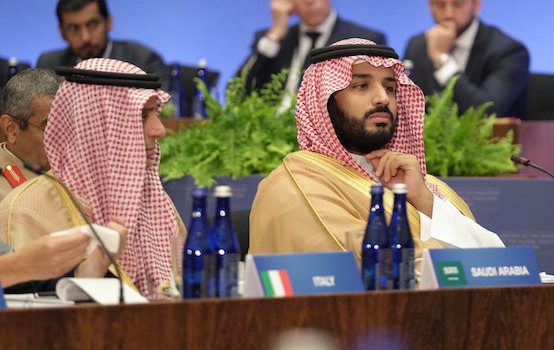The Toxic Prince and His American Yes-Men

Albert Hunt talks to Bruce Riedel about Saudi Arabia and its crown prince:
Saudi Arabia’s Crown Prince Mohammed bin Salman is miscalculating that the scandal over his role in the murder of a Washington Post columnist will fade away, starting with his presence this weekend at the G-20 meeting of global leaders in Argentina.
“He’ll have his picture with world leaders and say, ‘See, it’s all coming back to normal,'” said Bruce Riedel, a leading U.S. expert on the Middle East. “He’s wrong. Saudi Arabia and MBS now are toxic, and will be as long as he’s in power.”
Of course I agree with Riedel, and we can already see how much the Saudi position in Washington has deteriorated in just the last two months. Jamal Khashoggi was murdered by Saudi agents on the crown prince’s orders on October 2, and the first reports of the murder started coming out at the end of that week. In the eight weeks since then, there has been a huge shift in elite opinion against the current Saudi relationship in general and against the crown prince in particular. The Trump administration previously encountered limited resistance to its enthusiastic embrace of the kingdom, but now it is running into concerted opposition from members of Congress and sustained criticism from major media outlets. Secretary Pompeo admitted as much when he complained about the change in the political landscape at the beginning of his mendacious op-ed:
The Trump administration’s effort to rebuild the U.S.-Saudi Arabia partnership isn’t popular in the salons of Washington, where politicians of both parties have long used the kingdom’s human-rights record to call for the alliance’s downgrading. The October murder of Saudi national Jamal Khashoggi in Turkey has heightened the Capitol Hill caterwauling and media pile-on.
The truth is that there were very few politicians from either party calling for the downgrading of the relationship before October (it’s not an alliance), but the effect of the murder and the subsequent clumsy cover-up has been to destroy the Saudi government’s credibility even with many politicians that are otherwise sympathetic to the Trump administration’s regional policies. The “caterwauling,” as Pompeo calls it, has increased with each passing week as the president and other administration officials have done their utmost to act as accessories after the fact. If Trump’s handling of the Saudi relationship has become widely unpopular, it is because he and his officials have done a horrible job of managing it. Trump and Pompeo have gone all in with their bet on Mohammed bin Salman, and instead of cutting their losses when he became politically radioactive they chose to hug him and the Saudi government even more tightly. They have volunteered to be the crown prince’s apologists and yes-men in their misguided belief that he and Saudi Arabia are worth protecting, but all they have succeeded in doing is discrediting themselves and turning more people against a U.S.-Saudi relationship that used to be almost unquestionable in Washington. More than any of the relationship’s critics, the Trump administration and the crown prince have shown through their destructive partnership that the relationship is noxious and desperately in need of reevaluation. Assuming that the Senate passes S.J.Res. 54 today to end U.S. support for the war on Yemen over the administration’s objections (and it seems increasingly likely that it will), we can finally begin that long-overdue reevaluation of our ties to a reckless despotic client state.
Comments